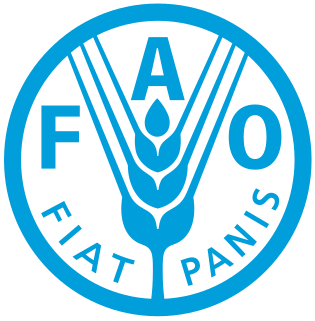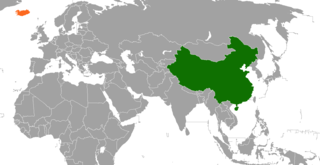
The Food and Agriculture Organization of the United Nations (FAO) is a specialized agency of the United Nations that leads international efforts to defeat hunger and improve nutrition and food security. Its Latin motto, fiat panis, translates to "let there be bread". It was founded in 16th October 1945.

The World Economic Forum (WEF) is an international non-governmental and lobbying organisation based in Cologny, canton of Geneva, Switzerland. It was founded on 24 January 1971 by German engineer and economist Klaus Schwab. The foundation, which is mostly funded by its 1,000 member companies – typically global enterprises with more than five billion US dollars in turnover – as well as public subsidies, views its own mission as "improving the state of the world by engaging business, political, academic, and other leaders of society to shape global, regional, and industry agendas".

The South Asian Association for Regional Cooperation (SAARC) is the regional intergovernmental organization and geopolitical union of states in South Asia. Its member states are Afghanistan, Bangladesh, Bhutan, India, the Maldives, Nepal, Pakistan and Sri Lanka. SAARC comprises 3% of the world's area, 21% of the world's population and 4.21% of the global economy, as of 2019.

Hankuk University of Foreign Studies is a private research university based in Seoul, in South Korea. HUFS currently teaches 45 foreign languages. In addition, it contains studies in humanities, law, social sciences, business, medical science, natural sciences, and engineering.

Heidemarie Wieczorek-Zeul is a German politician and a member of the Social Democratic Party (SPD) since 1965.

The Organization of the Black Sea Economic Cooperation (BSEC) is a regional international organization focusing on multilateral political and economic initiatives aimed at fostering cooperation, peace, stability and prosperity in the Black Sea region. It traces its origin to 25 June 1992, when Turkish President Turgut Özal and leaders of ten other countries gathered in Istanbul and signed the Summit Declaration and the "Bosphorus Statement". BSEC Headquarters – the Permanent International Secretariat of the Organization of the Black Sea Economic Cooperation – was established in March 1994, also in Istanbul.

Klaus Töpfer is a German politician (CDU) and environmental politics expert. From 1998 to 2006 he was executive director of the United Nations Environment Programme (UNEP).

The G20 or Group of Twenty is an intergovernmental forum comprising 19 countries and the European Union (EU). It works to address major issues related to the global economy, such as international financial stability, climate change mitigation, and sustainable development.

The University of Duisburg-Essen is a public research university in Duisburg and Essen, North Rhine-Westphalia, Germany and a member of the newly founded University Alliance Metropolis Ruhr. It was founded in 1654 and re-established on 1 January 2003, as a merger of the Gerhard Mercator University of Duisburg and the University of Essen.
The Virtual Global University (VGU) is a virtual university offering online distance education or virtual education on the Internet.

Transitions Online (TOL) is a media development organization and online journal covering news and events in the 29 post-Communist countries of Eastern Europe, Central Europe, South Eastern Europe, Russia, the Baltics, the Caucasus, Central Asia. It was founded in the Czech Republic in 1999.
Informatization or informatisation refers to the extent by which a geographical area, an economy or a society is becoming information-based, i.e. the increase in size of its information labor force. Usage of the term was inspired by Marc Porat’s categories of ages of human civilization: the Agricultural Age, the Industrial Age and the Information Age (1978). Informatization is to the Information Age what industrialization was to the Industrial Age. It has been stated that:

The Global Peace Foundation (GPF) is an international nonprofit organization with a stated mission to promote “an innovative, values-based approach to peacebuilding, guided by the vision of One Family under God.” GPF partners with government ministries, community and faith-based organizations, and United Nations offices to develop and execute programs in 20 countries.

China–Iceland relations formally began on 8 December 1971, when Iceland recognised Beijing. Prior to the signing of a Free Trade Agreement between the two countries in 2013, diplomatic activities between them were relatively few in number. However, since this event, political cooperation has increased. There is growing number of economic and cultural ties, as their political partnership has expanded.

The George C. Marshall European Center for Security Studies is a bi-national United States Department of Defense and Federal Ministry of Defence (Germany) security and defense studies institute. When the Marshall Center was founded in 1993, its mission was to create a more stable security environment by advancing democratic institutions and relationships, especially in the field of defense; promoting active, peaceful, security cooperation; and enhancing enduring partnerships among the nations of North America, Europe, and Eurasia. As of Oct. 1, 2014, the Marshall Center's regional mission changed to a transnational one based on an Office of the Secretary of Defense directive to change from a European to a global participants' base.

Klaus M. Leisinger is a social scientist and economist. Klaus M. Leisinger is founder and president of the Global Values Alliance in Basel. Until 2012 he was Managing Director and Chairman of the Board of Trustees of the Novartis Foundation in Basel, Switzerland.

Patrizia Nanz is a political scientist and an expert for public participation and democratic innovations. She is a professor of transformative sustainability studies at the University of Potsdam, and one of three scientific directors at the Institute for Advanced Sustainability Studies (IASS).

The Mercator Institute for China Studies (MERICS) is a German think tank with a focus on China. The non-profit organization was founded in 2013 by Stiftung Mercator, a private foundation in Germany. The institute’s focus is on political, economic, social, technological and ecological developments in China and their global impacts.
Werner Pascha is a German economist working on the Japanese and South Korean economies and on the international economic relations of East Asia. He has been influential in introducing an institutional economics and political economy perspective to East Asian studies in the German-speaking area. In addition, he has been very active in academic and semi-official organizations related to East Asia and East Asian studies.















